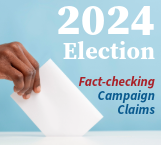
Este artículo estará disponible en español en El Tiempo Latino.
The Federal Emergency Management Agency said that no funds intended for disaster relief have been used to pay for programs that respond to illegal immigration. But former President Donald Trump has falsely claimed that the Biden administration “stole” money for hurricane recovery and spent it on housing for people in the U.S. illegally.

“This is false,” FEMA wrote on its “rumor response” page on Oct. 3. “No money is being diverted from disaster response needs. FEMA’s disaster response efforts and individual assistance is funded through the Disaster Relief Fund, which is a dedicated fund for disaster efforts. Disaster Relief Fund money has not been diverted to other, non-disaster related efforts.”
However, that same day, Trump said otherwise at a Michigan rally while talking about how President Joe Biden and Vice President Kamala Harris have responded to the devastation that Hurricane Helene caused in several southeastern states.
“[T]here’s nobody that’s handled a hurricane or storm worse than what they are doing right now,” Trump said. “Kamala spent all her FEMA money, billions of dollars, on housing for illegal migrants, many of whom should not be in our country.”
He went on to claim in his remarks that the administration was not able to provide hurricane relief to affected states and residents because they “stole the FEMA money, just like they stole it from a bank, so they could give it to their illegal immigrants that they want to have vote for them this season.”
Even after FEMA and news organizations had corrected Trump’s misinformation, he continued to make similar claims in public appearances. For instance, in an Oct. 4 town hall in North Carolina, one of the hardest hit states, Trump said that the federal government cannot help residents there because “we’re missing a billion dollars they gave … to the migrants that came in and now we don’t have the money.”
To be clear, federal law prohibits noncitizens from legally voting in federal elections, and there’s no evidence any disaster relief money is “missing.”
On its page responding to rumors about hurricane relief, FEMA says, “If you were affected by Helene, do not hesitate to apply for disaster assistance as there is a variety of help available for different needs.”
Separate Funding Accounts
Trump began making the false funding claims after Alejandro Mayorkas, secretary of the Department of Homeland Security, warned that FEMA, a DHS agency, may not have enough money to last for the remainder of the hurricane season, which started June 1 and goes until Nov. 30.
In an Oct. 2 press gaggle, a reporter asked Mayorkas a question about his confidence in the amount of funding that FEMA currently has for recovery efforts, and whether Congress may need to appropriate more money. In response, Mayorkas said: “We are meeting the immediate needs with the money that we have. We are expecting another hurricane hitting. We do not have the funds. FEMA does not have the funds to make it through the season and what is imminent.”
He went on to say that the agency has money for “the immediate needs right now,” because of a continuing budget resolution, “but that is not a stable source of supply, if you will.” He emphasized that this will be “a multibillion-dollar, multiyear recovery.”
As Mayorkas said, the federal government is currently operating on a continuing budget resolution because Congress has not passed appropriations bills for DHS and other federal departments for fiscal year 2025, which began Oct. 1. The stop-gap funding bill, which Biden signed in September, funds the government through Dec. 20.
While the continuing resolution included about $20 billion for disaster relief, E&E News reported that a FEMA financial report indicated that money may only last until January. When Congress passed the stopgap measure last month, lawmakers opted not to include any additional funding for hurricane relief.
For now, congressional leaders have decided to wait to work on a supplemental disaster spending package until Congress is back in session after the election in November.
After Mayorkas made his remarks, Trump and other critics began to focus on federal funding for the department’s Shelter and Services Program, claiming that money for the grant program was taken from the budget for responding to natural disasters. Some who made the claim got the inaccurate information from an Oct.1 Federalist story that misleadingly said: “The Biden-Harris administration took more than a billion tax dollars that had been allocated to the agency responsible for American disaster relief and used it to offer services for illegal immigrants.”
The Shelter and Services Program was created by Congress in 2023 specifically to make payments to “nonfederal entities that provide shelter and other eligible services to migrants encountered by and released from DHS custody,” as a Congressional Research Service report published that year explained. Congress authorized about $364 million for the program for fiscal year 2023, and increased the program’s appropriation to $650 million for fiscal year 2024.
As FEMA has said, that money was not rerouted from FEMA’s Disaster Relief Fund, which is funded by Congress separately. For fiscal year 2024, which ended Sept. 30, the Disaster Relief Fund had almost $57 billion in total budget resources, including about $20 billion in initial appropriations from Congress and more than $25 billion in supplemental appropriations.
“As Secretary Mayorkas said, FEMA has the necessary resources to meet the immediate needs associated with Hurricane Helene and other disasters,” a DHS spokesperson has said in a statement to reporters. “The Shelter and Services Program (SSP) is a completely separate, appropriated grant program that was authorized and funded by Congress and is not associated in any way with FEMA’s disaster-related authorities or funding streams.”
The money for migrant support came from the budget of U.S. Customs and Border Protection, another DHS agency, according to the CRS. FEMA administers the grants in coordination with CBP.
Trump’s campaign also has pointed to funding for FEMA’s Emergency Food and Shelter Program, which was established in 1983 and existed until it was replaced by the Shelter and Services Program.
In an Oct. 7 post on its website, the Trump campaign, citing that program, said that the White House and the media “have repeatedly said that FEMA money is being used for illegal aliens.” The post included a hyperlink to video clips of a CNN reporter and White House Press Secretary Karine Jean-Pierre talking in September 2022 about the availability of federal EFSP funds to help support local governments that were dealing with an influx of migrants.
Although funding for the Emergency Food and Shelter Program was administered by FEMA, that money also was appropriated by Congress separate from funding for disaster relief. Furthermore, “Congress passed the first funding measure for EFSP assistance specifically for migrant support … in 2019,” when Trump was president, the CRS said in a 2023 report.
Trump’s DHS Repurposed Disaster Money
In fact, as other news outlets have noted, in 2019, during the Trump administration, DHS officials did take some money from FEMA’s disaster relief budget to address issues at the southern border.
In August that year, which was during hurricane season, the Associated Press reported that DHS announced that it “would transfer $155 million to create temporary facilities along the U.S.-Mexico border for holding hearings with the aim of moving asylum cases through the system faster.”
“The money,” according to lawmakers, “will come out of unobligated money from the base disaster relief fund at FEMA,” the AP’s story said.
So, Trump is falsely accusing the Biden-Harris administration of something that DHS did under Trump.
Editor’s note: FactCheck.org does not accept advertising. We rely on grants and individual donations from people like you. Please consider a donation. Credit card donations may be made through our “Donate” page. If you prefer to give by check, send to: FactCheck.org, Annenberg Public Policy Center, 202 S. 36th St., Philadelphia, PA 19104.